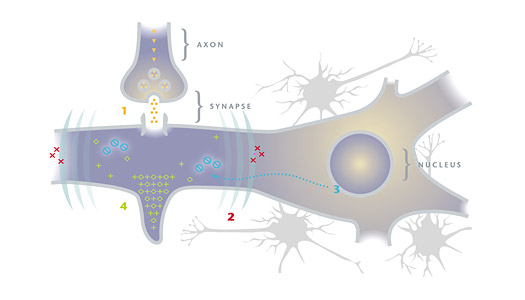Activity stimulates localized dendrite growth
Healthy neurons are graceful things, with a roundish cell body that houses the nucleus, a long, sturdy axon that carries impulses toward other neurons, and an array of delicate branches called the dendritic arbor...Gary Wayman says the arbor is the key to much of brain health, including a robust memory.
Wayman and his colleagues at the Oregon Health and Science University have traced much of what happens inside a neuron as a result of incoming signals. A welter of chemical details boils down to this: Dendrites contain a protein that inhibits their further growth. Synaptic activity blocks the protein and moves it away from the active site. Synaptic activity also prompts the neuron to make a tiny RNA molecule called micro RNA 132 (miR132), which suppresses the production of more inhibitor. When miR132 production goes up, there's less inhibitor and the dendrites grow more in areas with active synapses. When Wayman blocks miR132, more inhibitor protein is made and dendrite growth stops or slows down.
—from You Must Remember This, WSM Spring 2009.

WSM STAFF ILLUSTRATION
Activity stimulates localized dendrite growth:
(1) A neuron receives a nerve impulse at a synapse.
(2) That causes a growth inhibitor (![]() ) to move away from the area and
) to move away from the area and
(3) turns on a gene for miR132 (![]() ), which moves into the dendrite and blocks
production of more growth inhibitor.
), which moves into the dendrite and blocks
production of more growth inhibitor.
(4) With the inhibitor gone, stored proteins
(![]() ,
,![]() ) assemble to form a new dendritic spine.
) assemble to form a new dendritic spine.

Gary Wayman, Ph.D. :: Department of Veterinary and Comparative Anatomy, Pharmacology and Physiology (VCAPP) at the College of Veterinary Medicine at Washington State University :: Research with primary focus on determining the molecular and cellular mechanisms by which synaptic activity and neurotrophic factors influence neuronal development.
Photo by Robert Hubner.
